September 4 saw a successful day of action organised by Care and Support Workers Organise (CaSWO!) with actions in Newcastle, Preston, London and Manchester. The events were timely as the debate about social care is pushed up the media agenda by the bumbling and callous Tories claiming to have a plan to deal with a system in increasingly visible crisis. But as the CaSWO! press release points out ‘Not once during his statement did Johnson mention the appalling terms and conditions which care and support workers face – non paid travel time between clients, the fact we are not even entitled to minimum wage whilst on sleep in shifts, the fact that carers are leaving in droves to work for Amazon as the stress and ill health we face have just become intolerable.
While the debate about how social care should be funded is an important one as is the question of what sort of care and support services we need that enshrine dignity and respect for both workers and users this article will not focus on those questions, but on other key and neglected issues that also must be addressed in looking for solutions.
CaSWO! is a group of care and support workers who are campaigning for social support services which are fit for purpose for care workers and those they support. The group was set up early in the pandemic after the following the PPE crisis where care workers and those they provide support to were abandoned by the callous Tory government.
CaSWO! supporters are active trade unionists and work for common action and discussion of strategy across different unions as well as with Disabled People’s Organisations and in the wider labour movement
Before the pandemic
The crisis in social care certainly didn’t start with the pandemic.
There is a vicious cycle in which the work in the sector is, even more than health care, seen as an extension of the unpaid work of social reproduction done by women in the family. This is partly about the physical work of supporting people but also about the emotional labour involved in doing such work well and in a way that is responsive to individual users.
The assumption is that this is work women automatically know how to do – as a result of the fact that we have been socialised to assumed that the unpaid work in the home is our responsibility – so there is little training and no career structure. And those who need care and support, older and or disabled people, are treated as disposable by the powers that be – if not usually by their friends and family.
In this context the appalling wages, poor conditions and lack of respect with which the overwhelmingly female workforce is treated is no surprise. Three quarters of care workers in the UK earn less than the real living wage. They are paid less than cleaners, shop assistants and care assistants in the NHS.
And the disproportionate number of black, brown and migrant workers indicates that the extension of social reproduction work to these groups underlines the discrimination they face at work too.
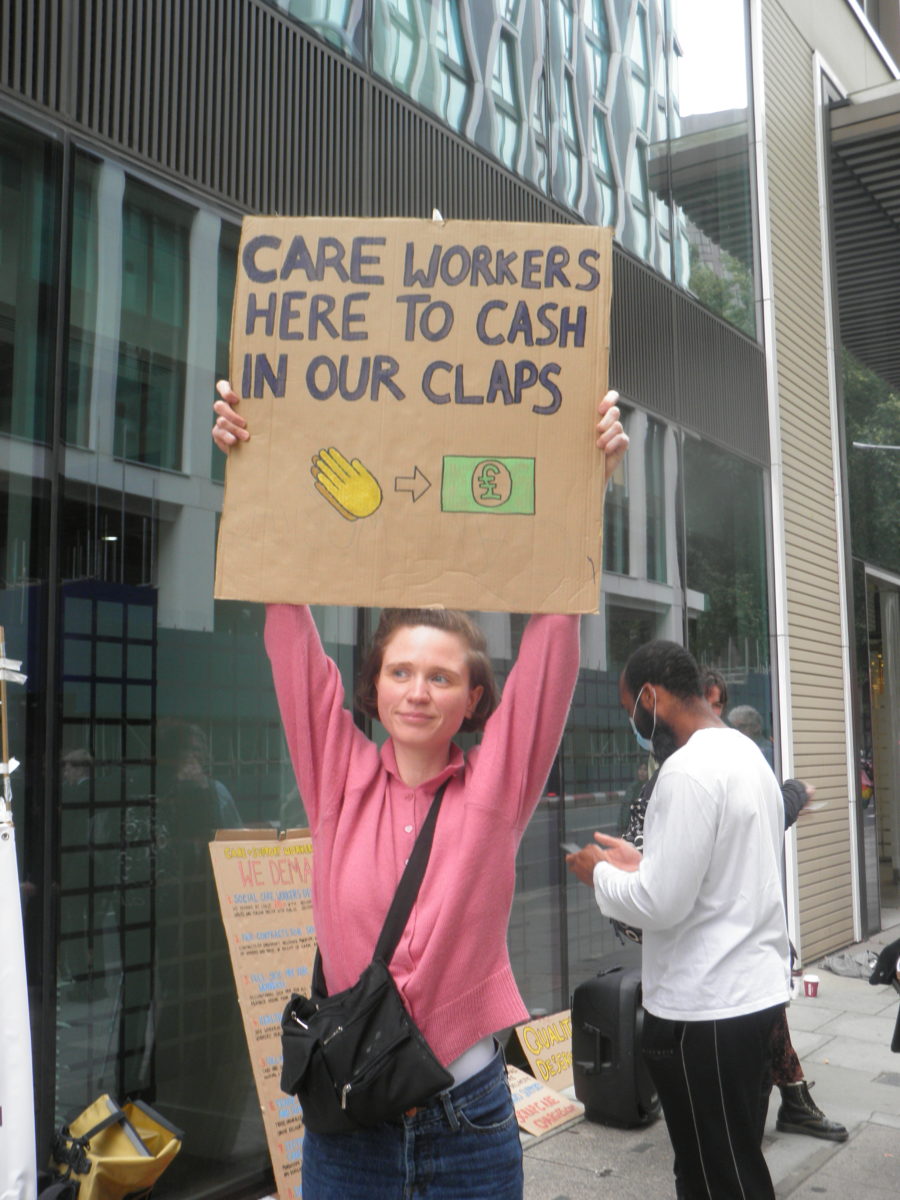
Appalling conditions mean that almost one in three staff in social care leave their jobs each year – almost one in two in home care. Stories of people leaving to go and work in an Amazon warehouse are not an invention of the media but an indication of how messed up the values of those in power. People before Profit is certainly an apposite slogan in this context.
All of this has become worse as a result of the outsourcing and privatisation of the sector which has taken place over the last 30 years. In 1979, 64% of residential and nursing home beds were still provided by local authorities or the NHS; by 2012 it was 6%. In the case of domiciliary care, 95% was directly provided by local authorities as late as 1993; by 2012 it was just 11%.
We are not disposable
Then we had the pandemic in which workers and users of residential care homes were treated as sacrificial lambs by Johnson and his cronies. People were discharged from NHS beds – often from long stay geriatric wards – without testing them for Covid – in order to free up those beds as the pandemic escalated. But while this fact got some coverage in the media what received much less attention was the fact that many care home residents went back and forward to hospital for routine appointments again without testing.
I know all this through bitter personal experience because the first happened to my mother – though she was on a short stay ward being treated for an infected leg. She was discharged to a nursing home just before lock down one because she was unable to live independently without 24 hour support by then unavailable. And I and other family members were unable to visit when lockdown lifted that summer because other residents developed Covid – almost certainly as a result of hospital visits. The distress and incomprehension on her face when my sister and I had to speak to her through a tiny gap in a window – not conducive to good communication for someone who was deaf – will stay with me for the rest of my life.
And all this was compounded by the PPE crisis. Again we know more from the media about the appalling and unacceptable situation in the NHS. But yet again care was the poor relation at many different levels.
So we know that there were 29,542 excess deaths of residents in all care homes in the first 23 weeks of the pandemic. Excess deaths represented 6.5% of all care home beds; higher in nursing (8.4%) than residential (4.6%) homes. 64.7% of the excess deaths were confirmed/suspected COVID-19. Almost all excess deaths were recorded in the quarter (27.4%) of homes with any COVID-19 fatalities.
It’s difficult for most of us to relate to large numbers and statistics – but each behind each of these deaths is a personal story – and usually the grief of those left behind not, often not able to visit or even to attend their funeral. Unspeakably heartrending. I’m hugely grateful that I was able to visit my dying mother regularly in the last month of her life in the nursing home and that we were able to have 30 people at her funeral this May as well as to livestream it to a larger group. I don’t think I could have dealt with my sorrow without having others around me sharing so many of the same emotions.
Care and support workers also died in large numbers during the pandemic –though finding accurate statistics is difficult. The Covid-19 death rate in social care staff was double that of the general working age population, according to new data published by the National Office for Statistics (ONS) in May 2020. Over 1,500 health and social care workers have died during the pandemic
Those dependent on domiciliary care to maintain their right to live independently are another group whose frustration and anger during the pandemic has been ignored. Many carers live a significant distance from those they provide support to and use public transport to travel from home and between clients (you are very unlikely to be able to run a car on those wages. Many carers especially in this sector are themselves in at risk groups. So not everyone went to work especially during the first lock down. People who had new support needs, especially on discharge from hospital or who developed new or deeper impairments couldn’t get assessments – or the support these indicated. And yet as we are constantly reminded residential social care is hugely expensive. Disabled people demanding independent living not surprisingly draw the conclusion that we are seen as disposable inconveniences…
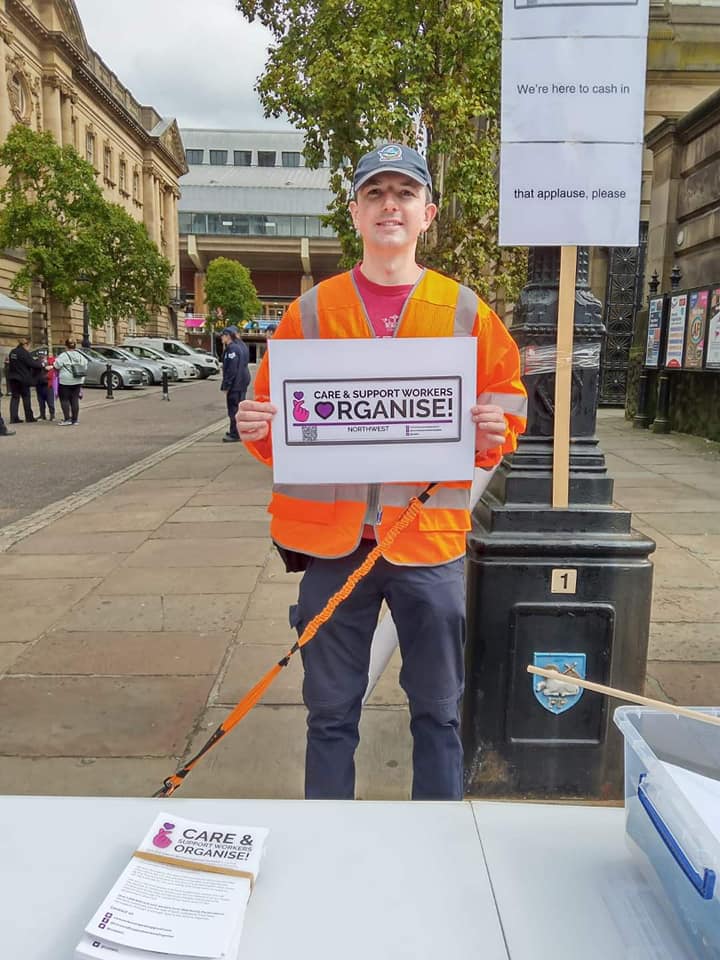
And social care charges are outrageously high. Given that the benefits system fails to pay for the additional costs of most impairments this means that very few disabled people are able to pay for the level of support they feel they need – and are therefore prevented from doing things that other people can do without much thought whether it’s visiting friends, participating in sport, going to the cinema – the list is endless,
The final outrage meted out the Care and support workers was the decision of the Supreme Court in March 2021 on sleep in shifts which ruled that workers were not entitled to be paid a wage during the hours when they were supposedly sleeping. The judgement – presumably made by someone who has never been a shift worker at all is based on the notion that people should not be paid when they are asleep. Seems commonsense? The reality is you don’t ever sleep soundly when you are on an overnight ‘sleep in’ and if you do need to provide support its very likely to take ages to even relax afterwards. For care and support workers this was yet another kick in the teeth.
Demands
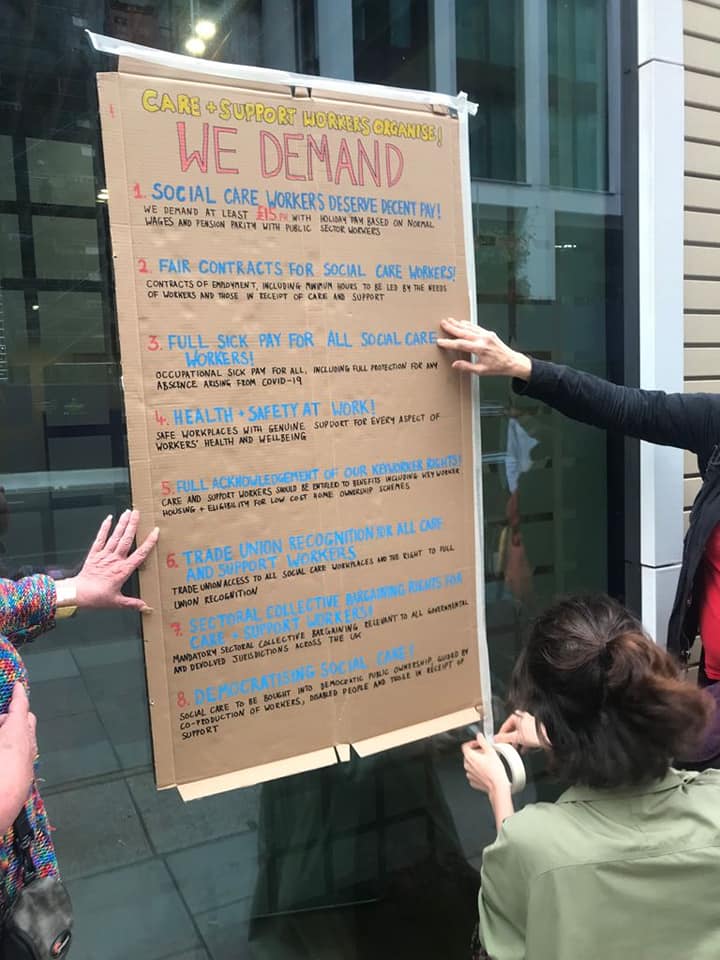
This is just part of the context in which CaSWO! has put together these demands – and in which Saturday’s protests were organised
1. Social Care Workers deserve decent pay! We demand at least £15 an hour with holiday pay based on normal wages and pension parity with public sector workers.
2. Fair Contracts for Social Care Workers! Contracts of employment, including minimum hours to be led by the needs of workers and those in receipt of care and support.
3. Full sick pay for all Social Care Workers! Occupational sick pay for all, including full pay protection for any absence arising from COVID-19.
4. Health & safety at work! Safe workplaces with genuine support for every aspect of workers’ health and wellbeing.
5. Full Acknowledgement of our keyworkers’ rights! Care and support workers should be entitled to benefits including access to Keyworker housing and eligibility for Low Cost Home Ownership Schemes.
6. Trade Union recognition for all care and support workers!Trade union access to all social care workplaces and the right to full union recognition.
7. Sectoral collective bargaining rights for care and support workers! Mandatory sectoral collective bargaining relevant to all governmental and devolved jurisdictions across the UK.
8. Democratising Social Care! Social Care to be brought into democratic public ownership, guided by co-production of workers, disabled people and those in receipt of support.
Resistance
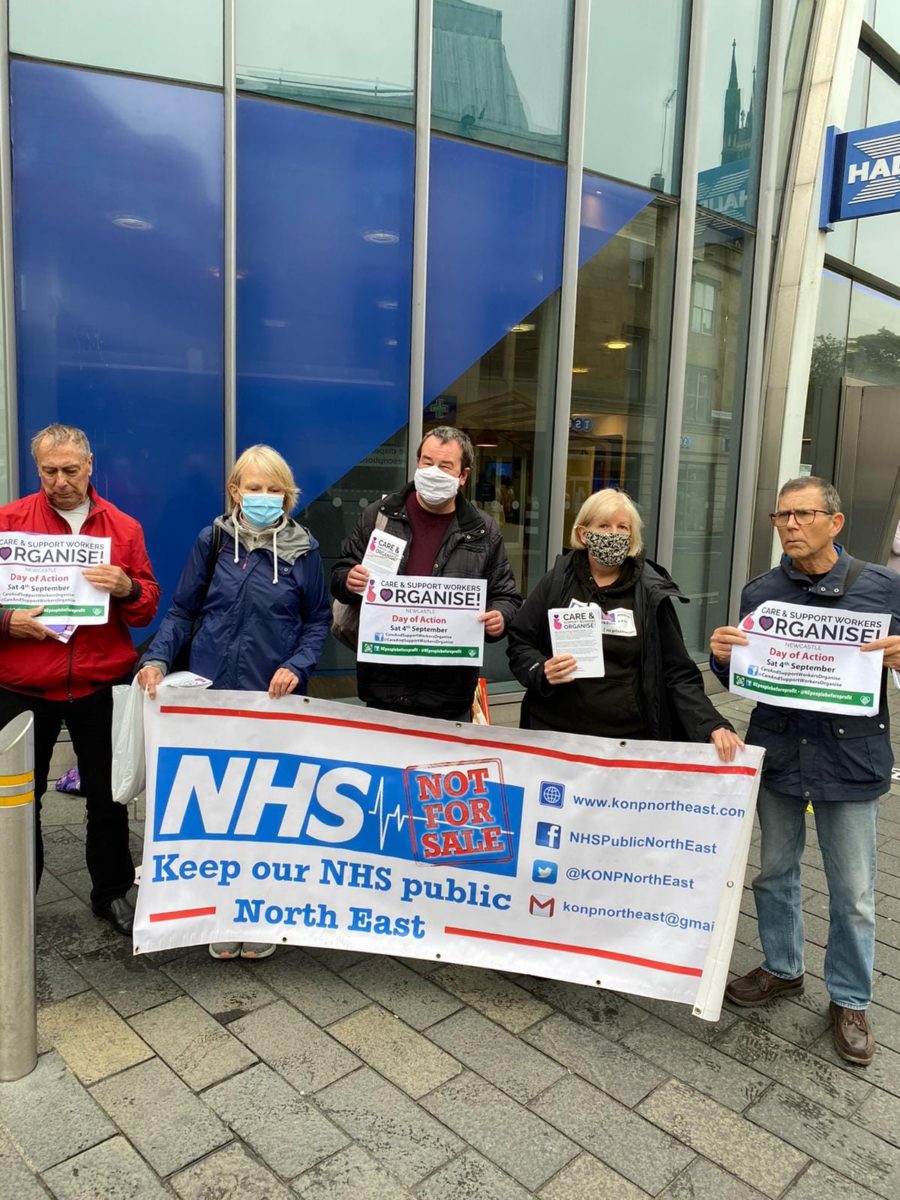
In Newcastle the protest was strongly supported by Keep our NHS public (KONP). This is great news as obviously the NHS is high up most people’s agenda and KONP has an extensive network of supporters in most areas. The link is also useful in developing a difficult but vital discussion about why many disabled people are concerned about a common assumption on the left that the needs of those using social care services would be perfectly met if we had a national care service which paralleled and worked together with the NHS. This misses the point that Disabled People’s Organisations have been fighting the idea that it is medical conditions that determine our oppression rather than a society which is callous and inaccessible at so many levels.
In Preston CaSWO! organised a stall to be able to explain why it was time to cash in the claps and distribute leaflets to passersby in the city centre
In London we gathered outside the Department of Health and Social Care to raise our voices in support of the eight demands. After leafleting members of the public we had a rally, skilfully compered by care worker Billie from Unite’s Housing Workers branch, where we heard from Sandra Daniels (Act 4 Inclusion), Bile and Julia from Sage care homes and United Voices of the World, Helen Davies from Barnet Unison and Unison]s NEC and Vicko Unite rep and striker from St Mungo’s. Simon Hannah from Lambeth Unison, Joseph Healy, speaking on behalf of the UNITE London & Eastern RISC (Regional Industrial Sector Committee) and sending our solidarity, myself on behalf of Hackney and Islington Unite Community and Danny Hogan Unite Greenwich Local Government Branch Secretary and Chair of London &Eastern Local Authorities Regional Committee also made shorter contributions.
In a powerful speech, Sandra argued that she wanted ‘to see a future where disabled and elderly people can exercise real choice and control; to self-determine their lifestyles by receiving the support they need. I’m also aware of the need for a radical re-evaluation of what care and support work is; an evaluation that recognises its importance; acknowledges the high levels of skills required and the contribution to the economy and the huge potential to generate green and purple jobs’.
You can watch her speech here;
Helen talked about the need for the different unions that organise in social care to work together – a message which was warmly received by the crowd – and later echoed by Bile in his contribution. She also spoke about the fight going on locally with Barnet council over their closure of Altorp Lodge (link) with not only contempt for the staff facing redundancy but for the residents who face losing their homes (link)
But it was Bile’s speech that had me and many others chocking back the tears as he failed to chke back his own. For many of us the struggle of the Sage workers for respect and dignity has been a real inspiration during the pandemic. His comment: ‘I think there are two viruses; Covid and the bosses who don’t see us; care workers, cleaners, domestics. But if we fight together across unions: UWV, Unison and Unite, then they will see us’ was hugely powerful.
Following the speeches we attempted to hand in the list of demands to the Department as the building was open throughout our action. The (presumably un-unionised) security guards told us it was more than their jobs were worth. At this point, as we were just deciding we had no option but to tape the demands to the building the police turned up and gave us permission to do that very thing. Completely surreal.
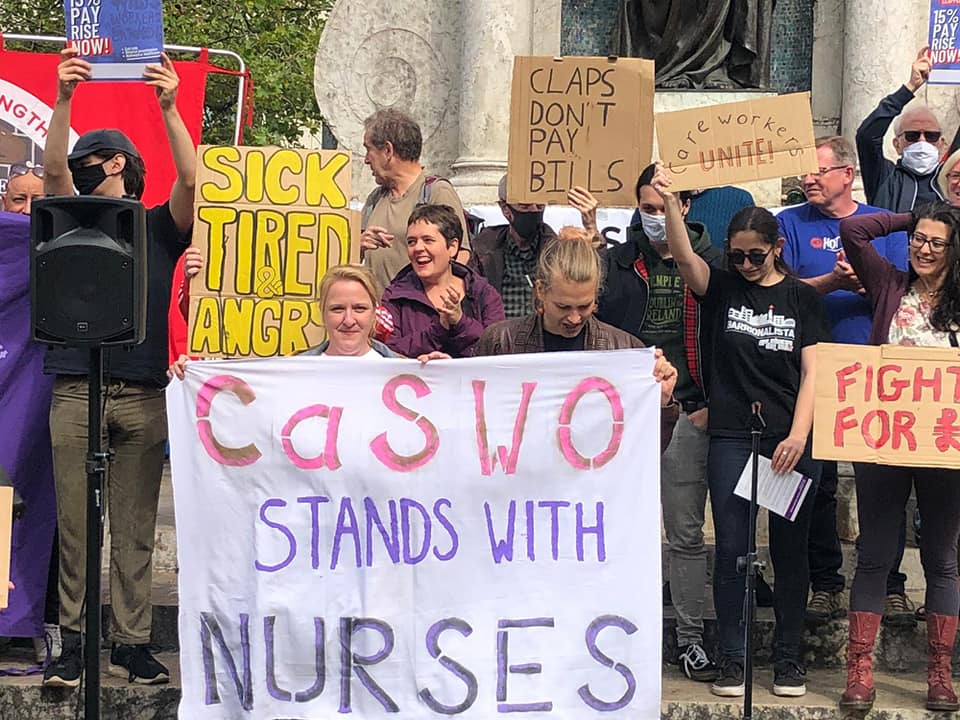
In Manchester, over 50 people rallied in Piccadilly Gardens for an enthusiastic rally. A lead supporter described his pain at losing a close friend in his 30s to Covid complications. Terry who was also a Unison steward leaves behind a grieving family. You can support the crowd funder here.
Jacquie Hadfield, secretary of Reclaim Social Care Greater Manchester, told the rally that campaigners wanted “a social care service of which we can all be proud.”
“Sadly that service is long overdue, leaving those who work in care and support services, those who need support in their daily lives and the thousands of unpaid carers who look after family and friends, exhausted, in despair and worried about a bleak future,” she continued.
Karen Buckley, of Manchester People’s Assembly, told the rally that her father worked in social care.
“He had a minor heart attack one day but had to go in to work the day after as he was on a zero-hours contract and could not afford to stay off work,” she said. Tragically the story that Karen told is all to familiar to workers in the desperately under paid sector.
Hilda Palmer from Hazards and mental health nurse, Unison NEC member Karen Reismann and care worker Noelle Fourie. also addressed the Manchester protest. You can see part of Noelle’s speech here.
Campaigners were pleased with the day of action. A photo of the London action made it into Monday’s Guardian while the Morning Star had a positive write up of the Manchester demonstration. Now CaSWO! supporters will be discussing how to build on this and extend and strengthen their reach as the crisis in social care becomes increasingly apparent to a wider audience.
Art Book Review Books Campism Capitalism China Climate Emergency Conservative Government Conservative Party COVID-19 Creeping Fascism Economics EcoSocialism Elections Europe Far-Right Fascism Film Film Review Fourth International France Gaza History Imperialism Israel Italy Keir Starmer Labour Party Long Read Marxism Marxist Theory Migrants Palestine pandemic Police Protest Review Russia Solidarity Statement Trade Unionism Ukraine United States of America War Women

